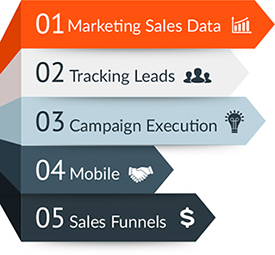
CRM Manufacturing Necessity for Industry
Manufacturing along with other industries has seen a significant transformation in the last two decades. From being a distribution centric industry, it has moved towards customer centric, as inventory is losing its life span. Every month or quarter, products are changing their shape and form, all due to extreme innovation. The automated CRM manufacturing machinery helps with ease to change the product form and composition.
Sign up to get FREE CRM Trial
This is where it becomes extremely important for the manufacturing division to know before hand what exactly is in the sales pipeline, the forecast. Traditional methods of marketing personnel, forecasting their sales while working in silos is not going to help the manufacturing division to plan. Advanced accurate forecast about the upcoming sales as per market requirements is needed by the manufacturing division,for not only to manage their inventory and but more importantly, the schedule.
Most of the manufacturing companies provide a product price list to their sales team and also provide a word document template to help to quote. A few companies allow their sales personnel to send pricing information directly to their customers by mail. The sales team prepares a periodic daily report, a weekly report which is forwarded to the head office for necessary action.
Major issues of concern in the traditional model are;
 The price list needs to be changed periodically as per the changes in the price of the raw material. The head office must continuously update the price list to the Sales Department, to enable them to pass on the price change to the end customers. The Sales Department needs to ensure that the Sales personnel across all regions adopt the revised price list with immediate effect.
The price list needs to be changed periodically as per the changes in the price of the raw material. The head office must continuously update the price list to the Sales Department, to enable them to pass on the price change to the end customers. The Sales Department needs to ensure that the Sales personnel across all regions adopt the revised price list with immediate effect.- When quotes are given by the sales personnel, it is at their discretion to mark a copy head office or not. Some sales personnel might do this while others might want to send information only for selected prospects that they are sure to win, rather than all.
- The daily Report and the weekly report need to be forwarded and checked as a must. If for some reason one report is missed, then the link is broken. The next report would start as a new one and historical data and comparison would become a challenge.
- If a sales executive or manager leaves the organization, the information managed in silos might be lost or taken away. The knowledge transfer process becomes very tricky in such situations.
- Sales personnel may project the prospect and the value of the order but probably would not be able to give accurate and detailed information on the product in daily or weekly reports.
- Nurturing lost orders and/or fine tuning the product is not facilitated.
Traditional CRM products facilitate the products and quotes module, whereby the company can put their comprehensive product catalogue in the system. Typically the head office or the product team can put it up and maintain it. As and when a new product is launched or price of product changes, the product catalogue is updated. All sales personnel are trained on the CRM Manufacturing; which is typically a web application. The sales personnel enter the new product or the data into the system and create a quote.Products and quantity a prospect is interested in can be added as and when interest is shown by the prospect. As per progress, alterations can be incorporated easily as all data already exists.
An automatic forecast will be readily available for the sales manager and a product specific forecast is also readily available for the manufacturing head. Over a period of time the company can make accurate forecasts by implementing certain processes as also by training their sales personnel accordingly.
When sales personnel lose some of the probable orders, the product team can analyse if a pattern exists and also get to pin point the problem. It can also be known if certain products are losing because of a new variant or changes implemented by a competitor. Literally, product variants can be created based on the feedback from the market instead of designing at the board room.
On the other side, if the customer is facing challenges with their product or delivery or any other issue, he can complain to the sales person or support member. These complaints can be tracked by assigning ticket ids or case ids and maintaining all communication together. Complaints can be analysed to deduce the problems, which can then be rectified accordingly.While future complaints will be avoided, this will help to go a long way and at the same time enhance the goodwill of the company.
CRM Manufacturing can add significant value by helping companies to manage their customers, contacts, leads, opportunities, quotes and development, amongst other activities.
To find out more about CRM Manufacturing, click here![]() to conduct a free call.
to conduct a free call.



